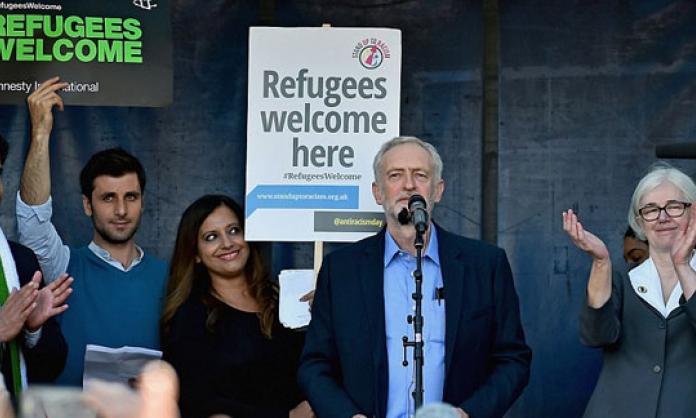The newly elected leader of the British Labour Party cut short his victory speech so he could go to address a 50,000-strong protest in central London in support of refugee rights. After hailing what he called a “people’s uprising” across Europe, he joined musician Billy Bragg in a stirring rendition of the socialist anthem, “The Red Flag”.
It was, to put it mildly, not a normal day in UK politics.
The election to the Labour leadership of radical left winger Jeremy Corbyn, who secured a huge 60 percent of the vote in a four-horse race, is a stunning repudiation of the right wing pro-austerity policies that have dominated the Labour Party since the mid-1980s.
The Telegraph called it “the death of Blairism”, and it was not wrong. But it is much more than the victory of one faction of the Labour Party over another. So fundamentally have pro-market policies entered the DNA of the party apparatus, its parliamentarians and its spokespeople, that for many of them this result is simply unimaginable.
The framework of what is acceptable for mainstream political parties has become so narrow that it is generally difficult to tell Tory from Labour. And Corbyn is not just marginally different from the Blairite mainstream. He has spent his whole political life as a radical left activist. In the complacent, institutionalised, well-heeled world of modern social democracy, Corbyn’s unapologetic leftism seems from another planet.
His first response to being elected was not to fawn on the party establishment, but to celebrate the rebellion that has swept the party. Writing in the Observer, Corbyn said:
“Labour’s leadership election has been an extraordinary demonstration of grassroots democracy and public participation, which has turned the conventional wisdom about politics on its head. We have drawn in hundreds of thousands of people of all ages and backgrounds from across the country, far beyond the ranks of longstanding activists and campaigners. Who can now seriously claim that young people aren’t interested in politics or that there is no appetite for a new kind of politics?
“Above all, it has shown that millions of people want a real alternative, not business as usual, either inside or outside the Labour party. The hope of change and bringing big ideas in is now back at the centre of politics: ending austerity, tackling inequality, working for peace and social justice at home and abroad. That’s why the Labour party was founded more than a century ago.
“This election has given that founding purpose a new force for the 21st century: a Labour party that gives voice to the 99 percent.”
Corbyn’s victory has the potential to open up a new epoch in British politics, in which socialist ideas have a voice in the mainstream debate. But it will be an almighty battle. The whole political establishment will fight tooth and nail to prevent the emergence of any serious alternative to the status quo.
You only need to look at the punishment meted out by the European ruling class to the Syriza government in Greece to understand the lengths to which the powerful will go to ensure submission to their will.
The right wing rebellion by the old guard inside Labour has already begun, with a string of frontbenchers refusing to serve in Corbyn’s shadow cabinet. Good riddance to them – if Corbyn is to have any chance of success, these reactionary parasites have to be driven from the party.
The press, too, will present a formidable opposition. Every outlet from the Telegraph on the right to the Guardian on the liberal left can be relied upon to do everything they can to tame Corbyn or bring him down.
The bankers and industrialists who control the levers of economic power, the military generals who are aghast at Corbyn’s desire to abolish Trident and withdraw from NATO – all will join, openly or covertly, the campaign against a radical Labour opposition.
But while the election of Corbyn is bringing out every anti-democratic instinct in the ruling elite, there is a real democracy in Britain. It is the democracy of mass mobilisation from below – whether manifested in strikes and protests against austerity and war or in the political movement that broke the Blairite grip over the Labour leadership.
If, as Corbyn promised, change is coming to the UK, it will have to be based on building a struggle from below that can take on the many and varied forces that are now gearing up to defend the status quo.











